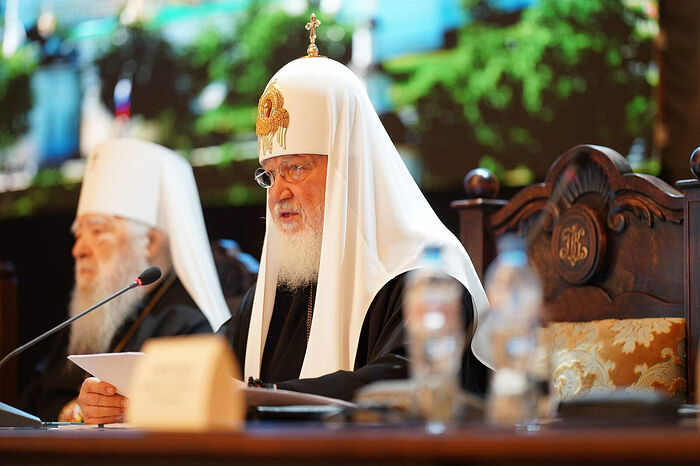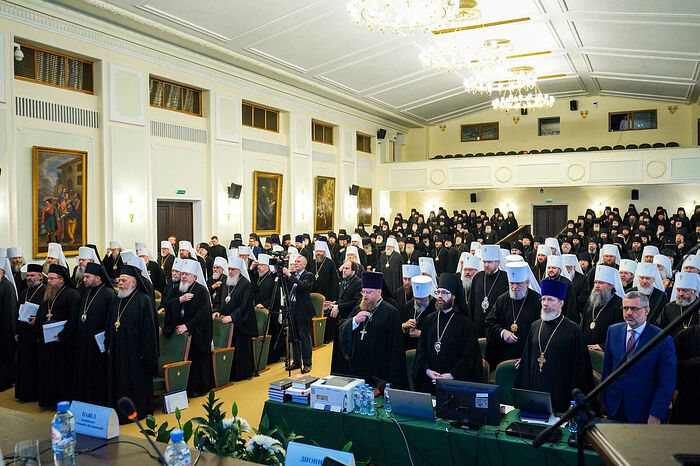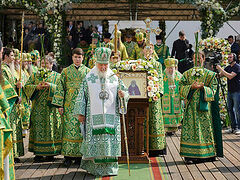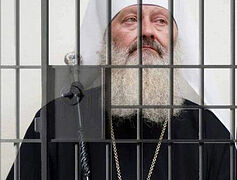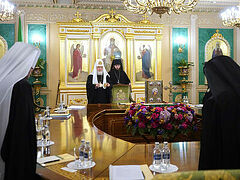Sergiev Posad, Moscow Province, Russia, July 20, 2023
A host of hierarchs of the Russian Orthodox Church gathered at the Holy Trinity-St. Sergius Lavra yesterday “for a fraternal discussion of current issues of Church life.”
The Bishops’ Conference was held in lieu of a Bishops’ Council, which has been postponed several times in recent years, first due to the COVID pandemic, then to the war in Ukraine. A Bishops’ Council is much larger than a meeting of the Holy Synod, including every hierarch of the Russian Church. The last Bishops’ Council was held in 2017. The present Bishops’ Conference was mandatory for all hierarchs on the territory of Russia, while bishops from abroad were to come if conditions allowed.
The conference began with a comprehensive report on various issues of Church life by His Holiness Patriarch Kirill of Moscow and All Russia, followed by a discussion of the report.
Then His Eminence Metropolitan Hilarion of Budapest and Hungary presented a report on the preparation of the document “On the Distortion of the Orthodox Teaching About the Church in the Acts of the Hierarchy of the Patriarchate of Constantinople and the Speeches of its Representatives” by the Synodal Biblical and Theological Commission. The hierarchs then held an open discussion about the document.
Abbess Ksenia (Chernega), head of the Moscow Patriarchate’s Legal Department, then presented a report on changes in secular legislation.
The Conference concluded with discussion and the adoption of an official Conference resolution.
The resolution contains 10 points addressing the schism in Ukraine and the persecution of the canonical Ukrainian Orthodox Church; the war in Ukraine and the need for effective pastoral care for all soldiers and those who return wounded; the heretical ecclesiology of the Patriarchate of Constantinople; and the need for rigorous preparation for candidates to the priesthood.
In particular, the resolution refers to the Ukrainian government as “the direct heir of the Bolshevik God-fighters,” and praises those in the Ukrainian Orthodox Church whom the Russian Church sees as fighting for Church unity, which, within the context of the Patriarch’s opening speech and previous Synodal statements, means those who continue to commemorate Pat. Kirill in Ukraine (see below).
The conference resolution reads in full:
1. The hierarchs of the Russian Orthodox Church, gathered under the chairmanship of His Holiness Patriarch Kirill of Moscow and All Russia in the monastery of the abbot of the Russian Land, St. Sergius of Radonezh, give thanks to God, glorified in the Holy Trinity, for His all-merciful providence for the Church and His people, visibly acting in these difficult times, when enemies have taken up arms against Holy Rus’, wishing to divide and destroy its united people (from the prayer for Holy Rus’).
2. The calamities experienced by our peoples encourage all the faithful children of the Church to strengthen their prayers to God, to strengthen faith in Him, to persevere in the hope of His mercy and intercession, to grow in love for Him and for others.
3. The news of the dead and wounded as a result of the military confrontation, the homeless, and the refugees bring deep sorrow. May the Lord grant rest to the souls of all who have been slain in the days of the present battle. May He grant consolation to the sorrowing, and bestow all good things from His bounty to the needy. By the grace of God, many people—clergymen and laymen, statesmen and ordinary workers have shown genuine Christian love in the current circumstances, uniting to help those in need and suffering as much as possible. May the Lord reward them in this age and in the age to come.
4. With particular emotion, the participants of the Bishops’ Conference offer their prayers to God for military leaders and soldiers. May the Lord preserve them from wounds, captivity and death, may He protect them from all evil, sin and unrighteousness. May he grant rest to the souls of the soldiers who laid down their lives for their faith and fatherland on the battlefield, who died of wounds or were tortured in bitter captivity, in His habitations. Eternal memory to them.
5. Soldiers participating in combat operations need special pastoral attention and care. Clergymen sent to serve in a combat zone must undergo thorough training, and diocesan bishops are called upon to ensure that married clerics continue to receive their income from the parishes to which they are assigned.
The pastoral participation of the clergy in the rehabilitation of soldiers returning from the territory of hostilities is also important. In accordance with the centuries-old pastoral practice, the giving of the Holy Mysteries of Christ may be restricted due to participation in military operations for a time of repentance only upon individual consideration of the situation by the pastor and in special cases, for example, when a soldier committed military crimes that resulted in the death of people, or when it can help heal spiritual wounds.
6. Today, on Ukrainian soil, the state power has revealed itself to be the direct heir of the Bolshevik God-fighters and is raising persecution against the Orthodox Church. The faithful children of the Church are expelled from churches; hierarchs, clergy and laity are subjected to unjust arrests and dishonorable trials; holy sites are desecrated and plundered. The news that the authorities are trying to force the clergy and laity of the Ukrainian Orthodox Church to renounce God’s truth and push them into schism is particularly bitter. The participants of the Bishops’ Conference call for a special prayer for our Orthodox brothers and sisters in Ukraine, for those who, despite threats, slander and persecution, strive to preserve Church unity, especially for those who show a truly confessional feat, courageously raising their voices in defense of this unity. Many years to Metropolitan Pavel of Vyshgorod and Chernobyl, who is now in prison, and to all the hierarchs-confessors who are facing criminal persecution for the faith and the Church!
7. The Bishops’ Conference notes with regret that the leaders of the Patriarchate of Constantinople, blinded by the thirst to satisfy private interests and ambitions, have become one of the instruments of political forces hostile to Orthodoxy. Having considered the conclusion presented by the Synodal Biblical and Theological Commission “On the Distortion of the Orthodox Teaching About the Church in the Acts of the Hierarchy of the Patriarchate of Constantinople and the Speeches of its Representatives,” the participants of the Bishops’ Conference agree with the conclusions of this document and submit it to the Holy Synod for approval.
8. Noting that people especially need the consolation and kind attention of pastors in the current alarming conditions, the Bishops’ Conference calls all bishops and priests of the Russian Orthodox Church to unremitting pastoral work, to an attentive attitude towards parishioners, to multiply efforts to educate the people, and the children of the Church—to active participation in the liturgical, public, and charitable activities of the life of parish communities. Diocesan bishops are called upon to take special care of the needs of the clergy and parish workers entrusted to them.
9. The Bishops’ Conference once again draws special attention to the need for careful preparation of candidates for holy orders. It is necessary, according to the word of the Holy Apostle, not to lay hands on anyone hastily (1 Tim. 5:22), to test candidates for holy orders, to properly prepare them for the upcoming work, and to observe carefully observe the first steps of newly ordained clerics. Noting with satisfaction the ongoing Church-wide work to improve the educational level of the clergy, the Bishops’ Conference requests the Holy Synod to consider the possibility of combining existing theological educational institutions for more effective further work on the education and upbringing of future pastors. At the same time, the rules established by the Holy Synod (Journal No. 112 of August 30, 2019) regarding the distribution of graduates to those dioceses that sent them to study should be carefully observed.
10. The participants of the Bishops’ Conference in the House of the Holy Life-Giving Trinity at the holy tomb of St. Sergius of Radonezh, remaining in love with each other and in one mind, pray with faith and hope to our Lord and Savior Jesus Christ, Who is able to heal all kinds of disorder, comfort all sorrow, and grant His people deep and unending peace. May the Lord and God preserve the Russian Church and all its servants: archpastors, reverend pastors and deacons, pious monks and nuns, faithful laymen—and may He send abundant mercies down upon His people, so that we may grow in grace, and in the knowledge of our Lord and Saviour Jesus Christ. To him be glory both now and for ever. Amen (2 Peter 3:18).
The resolution is largely a summation of the Patriarch’s opening report. However, in particular, concerning the misguided deeds of Constantinople in Ukraine and the persecution of the UOC, the Patriarch stated:
The turmoil sown by the Phanar brought bitter fruits and, in particular, led to open persecution of the Ukrainian Orthodox Church by the state authorities. Soon after the invasion of Constantinople in Ukraine, discriminatory laws against the canonical Orthodox Church began to be adopted, slander was spread in the media, intolerance and hatred of the Ukrainian Orthodox Church were whipped up. Churches have been lawlessly seized and are being seized with the use of brute force. Searches were conducted and are still being conducted in churches, as well as at the place of residence of hierarchs and clerics. The clergy have been and are being subjected to brutal pressure through humiliating interrogations by special services, the pressure of an excited crowd, which often united schismatics with the most fringe pagans and people who are generally alien to any faith.
These persecutions have acquired a new scope since the beginning of 2022. We have seen the arrests and beatings of God’s servants, and blasphemy against holy sites. Lawsuits against several bishops have been initiated and are continuing. Cases of the expulsion of Orthodox communities from churches have multiplied. The ancient Kiev Caves Lavra is under threat of closure. Its main churches—the Dormition Cathedral and the Refectory Church—were seized from the Ukrainian Orthodox Church, and schismatics serve in them. One by one, the buildings of the monastery are being confiscated. The abbot of the Lavra, Metropolitan Pavel of Vyshgorod and Chernobyl, after a three-month stay under house arrest under far-fetched pretexts and relying on false accusations, was imprisoned in a pre-trial detention center. Vladyka, who is 62 years old, suffers from serious illnesses, including diabetes mellitus. His life is under threat. I ask all of you, dear brothers, to pray especially for him. Today he is a confessor who remains faithful to his episcopal oath and the unity of our Churches… It is quite obvious that the Ukrainian authorities have begun to liquidate the canonical Ukrainian Orthodox Church, without paying any attention to the so-called European values, which presuppose, among other things, freedom of religion and respect for human rights. The question arises: how will the European rulers and human rights organizations react to this incident? We are looking forward, though not without doubts, to their reaction.
I want to say once again that at the moment we are talking about a war against Orthodoxy, because all this cannot but weaken Universal Orthodoxy. In this case, the Phanar is a tool in the hands of skillful manipulators, and it has been such a tool for many years.
Pat. Kirill also spoke about the fact that the Ukrainian Orthodox Church and clerics and dioceses elsewhere have ceased commemoration of him as a ruling bishop over them, calling it a path to schism:
One of the consequences of the actions taken against Orthodoxy and Church unity was a number of canonical disorders. In particular, we see that in a number of dioceses and parishes in those territories where states exert pressure on the Church, the commemoration of the Patriarch’s name, provided for by the canons, has stopped. The Holy Synod pointed out the inadmissibility of such actions in its rulings of May 29 and June 7 last year. Of course, the prayer of the whole Church for me—from the episcopate, clergy, and people—strengthens me and is very dear to me. But now we are not talking about any personal experiences or personal devotion to the current bearer of the Patriarchal dignity. We are talking about the preservation of Church unity commanded to us by the Lord, one of the external expressions of which, in accordance with the canons and with the centuries-old tradition, is the commemoration of the Primate of the Local Orthodox Church at the Divine services. The termination of such commemoration is an open door to sliding into schism. The clergy have the right not to fulfill the lawless demands to refuse the commemoration of the Patriarch, and the laity to legitimately expect their clergy to perform such commemoration and preserve the unity of the Church.
And regarding whether it is possible to receive Holy Communion in churches where the Patriarch is not commemorated, he stated:
In the current circumstances, some faithful children of the Orthodox Church have a painful question: Is it possible to receive Communion and pray in churches where the Patriarch is not commemorated—are the Sacraments valid there? The Moscow Patriarchate receives many letters about this. I will say this: If there is an opportunity to attend services in a church where the clergy remain faithful to the canonical order of commemoration of the primate of the Church, it is necessary to go to such a church. If there is no such possibility at all, then until the Church has passed a conciliar judgment on the fall of certain bishops and clergy into schism, the Sacraments celebrated by those who have become victims of blackmail or who did not have the courage or conscience to preserve this canonical order remain valid. At the same time, it is just—and there is no disobedience in this—not to accept words rejecting Church unity and directed against it, which, unfortunately, can be heard from some clergy.
Follow OrthoChristian on Twitter, Vkontakte, Telegram, WhatsApp, MeWe, and Gab!

